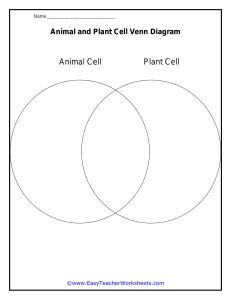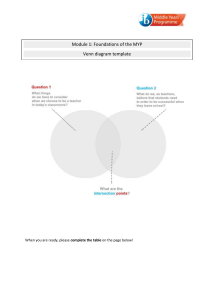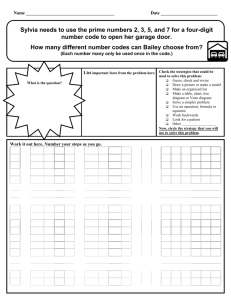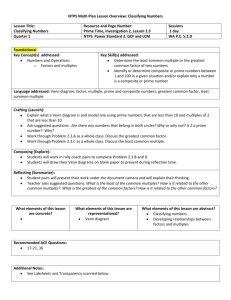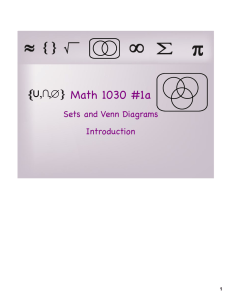Venn Diagrams: Formal Notation - IGCSE Mathematics Teaching Pack
advertisement
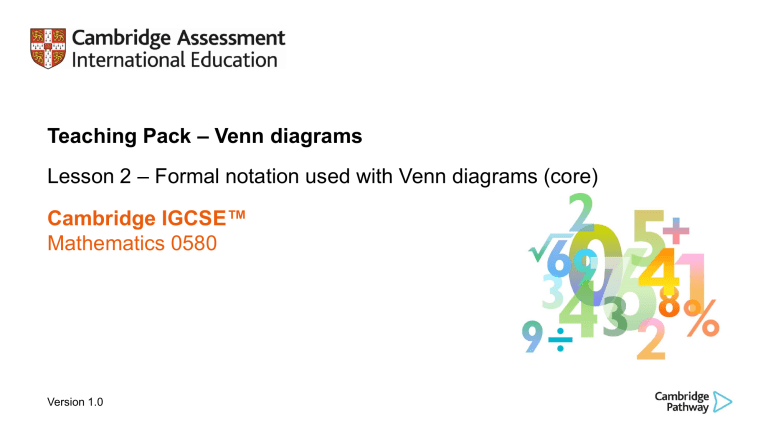
Teaching Pack – Venn diagrams
Lesson 2 – Formal notation used with Venn diagrams (core)
Cambridge IGCSE™
Mathematics 0580
Version 1.0
Lesson objective
Understand notations associated with Venn diagrams, the intersection
and union of sets and complement of a set.
Try this!
Skin has yellow and
brown patches
Guess
the
animals
?
Lives in Africa
Lives in Australia
Mammal
Tall
Hibernates
?
Eats meat Can climb
?
Can you
suggest
animals for
each of the
other
sections?
Lays eggs
Grows to over 2.5m tall
?
Bird
Can’t fly
Try this!
E
15
9
5
10
14
Use the diagram to find
1
7
4
2
11
Put all the numbers from 1 to 15,
inclusive, into this diagram.
6
3
8
13
12
Prime
Numbers
Factors
of 24
a) How many numbers are both
prime and factors of 24?
n( Prime ∩ Factor 24) = 2
b) How many numbers are either
prime or factors of 24?
n( Prime ∪ Factor 24) = 10
Notations used with Venn diagram
The intersection of two
sets, A ∩ B, consists of the
elements that are common
to both sets A and B.
A
B
The union of two sets,
A ∪ B, consists of the
elements which appear in at
least one of the sets A or B.
A
The complement of
the set A, A′, are the
elements not in A
B
A
A AND B
A∩B
Intersection of A and B
A OR B
A∪B
Union of A and B
B
Not in A
A′
Complement of A
Try this!
E
X
Y
4
6
3
12
9
1
Write down all the elements in:
2
8
5
7
10
11
a) X
{3,6,9,12}
b) Y′
{1,2,3,5,6,7,9,10,11}
c) X ∩ Y
{12}
d) X ∪ Y
{3,4,6,8,9,12}
How would you describe the elements in each set?
X: All multiples of 3 that are less than 13
Y′: Numbers that are not multiples of 4 and less than 13
X ∩ Y : Common multiples of 3 and 4 less than 13
X ∪ Y : Either multiples of 3 or 4 less than 13
Try this!
Draw a Venn Diagram for the information below:
A
E
E = {1, 2, 3, 4, 5, 6, 7, 8, 9, 10, 11,12}
A = {x: x is a factor of 12}
B = {y: y is a prime number less than 13}
Write down all the elements that are in:
4
12
8
6
1
B
2
3
5
10
a) A ∩ B
{2,3}
b) A ∪ B
{1,2,3,4,5,6,7,11,12}
c) A′
{5,7,8,9,10,11}
d) A′∩ B
{5,7,11}
e) A′ ∪ B
{2,3,5,7,8,9,10,11}
f) (A ∩ B)′ {1,4,5,6,7,8,9,10,11,12}
11
7
9
(n) Number of elements
E
B
A
4
12
8
6
1
2
3
10
5
11
7
9
NOTE:
Since there are two elements in A ∩ B we can say that n(A ∩ B) = 2
There are nine elements in A ∪ B so we can say that n(A ∪ B) = 9
Try this!
Draw a Venn Diagram for the information below:
E ={1, 2, 3, 4, 5, 6, 7, 8, 9, 10, 11,12}
A = {x: x is divisible by 2}
B = {y: y < 6}
E
A
6
8
12
Find n(A ∪ B)
9
Find n(A′)
2
4
5
1
3
9
7
Write down all the elements in the set A ∩ B
10
B
11
{2,4}
6
Find n(A′ ∩ B′)
Write down all the elements in A′ ∩ B
{1,3,5,}
Write down all the elements in A ∪ B′
{2,4,6,7,8,9,10,11,12}
3
Find n((A ∪ B)′)
3
